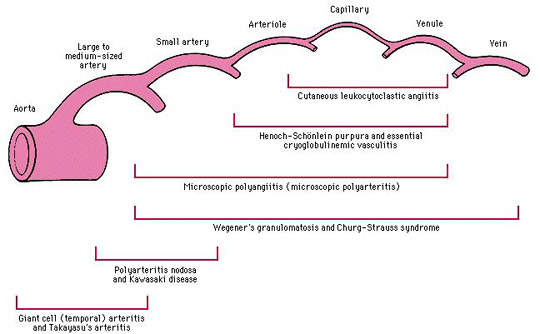
The diseases that affect the small vessels include some of the most common types of vasculitis. They are often divided into the diseases where anti-neutrophil cytoplasm antibodies (ANCA) are found in the blood (ANCA associated vasculitis) and diseases where ANCA is not found. The ANCA associated vasculitides are Wegener’s granulomatosis (now called Granulomatosis with Polyangiitis) Microscopic Polyangiitis and Churg-Strauss syndrome (now called Eosinophillic Granulomatosis with Polyangiitis).
Many of the small vessel diseases can cause damage to the kidneys and prevent them working. The typical symptoms of impaired kidney function would be fatigue, poor appetite, and swollen legs and breathlessness due to retention of fluid. In severe cases acid and toxins accumulate in the body causing severe breathlessness, nausea and vomiting, confusion and epileptic fits. The blood pressure may also be very high which can cause damage to the kidneys, heart, brain and other organs.
Any patient with vasculitis should have the urine tested for blood and protein using a dipstick test. The presence of blood and protein can indicate inflammation in the kidneys and requires urgent assessment (within a few days) by a kidney specialist and may need a kidney biopsy. If not treated urgently inflammation in the kidneys can cause permanent damage needing dialysis treatment or kidney transplantation.
In the early stages of kidney inflammation the blood tests of kidney function (creatinine and estimated glomerular filtration rate (eGFR) may still be normal – this is the best time to treat before significant damage has occurred.
